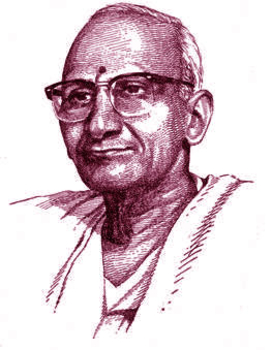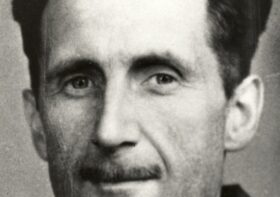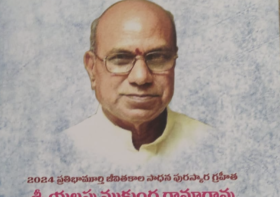Sri Viswanatha as a Short Story Writer

(ఈవారం తెలుగు పుస్తకాల గురించి ఇంగ్లీషు వ్యాసాలు ప్రచురిస్తున్నాం. ఈ రోజు విశ్వనాథ కథల గురించి సి.ఎస్ రావుగారి వ్యాసం, రేపు “కీలుబొమ్మ” నవల గురించి జి.ఆర్.కె మూర్తిగారి వ్యాసం, ఎల్లుండి “సహస్ర శిరచ్ఛేధ అపూర్వ చింతామణి” జానపద కథపై రాఘవేంద్రగారి పరిచయవ్యాసం ప్రచురించబోతున్నాం. ఈ వారం ఈ ఫోకస్ను నిర్వహించడానికి వీలుగా ఈ వ్యాసాలను పంపిన వ్యాసకర్తలకు మా ప్రత్యేక ధన్యవాదాలు – పుస్తకం.నెట్ )
Article by: C.S.Rao
Sri Viswanatha is an ace story teller. The phrase “story teller” has a special meaning and appropriateness in his case. He really tells a story in a gripping way. He narrates the story, and his narrative style which is entirely his own, absorbs our attention totally and thoroughly. We just cease to be readers and become passive but enthusiastic participants in the story that unfolds as he narrates. He is undoubtedly a genius and so it need not be specially mentioned that he does not emulate, not to say, in the least, imitate anybody. Lots of people think that the best way of letting a story emerge is through dialogues. They may not be wrong, but that is not Viaswanatha’s way. He sets an example, and others should deduce theories from it. He has written a number of play lets and plays, nobody can really surpass him at dialogue-writing. But, in his stories he perhaps chooses to narrate rather than introduce dialogues frequently. He does use them but sparingly, but when he uses them they will have a great revealing power, and this revealing power he achieves by his narrative technique as well as when he uses dialogues, but the narrative style is much more native to him in story telling.
His narration is simple, direct and very powerful, that is to say, very effective. It achieves the intended effect effortlessly. The whole of his writing seems and sounds effortless. Everyone knows Sri Viswanatha simply dictates short stories, play-lets, plays, novels, and even poetry extempore. This is not an ordinary merit. They simply flow like an unimpeded stream from his brilliant mind. Strangely, he is thought to be a difficult writer; his style is wrongly thought to be classical in character. This must be either a biased remark or one which has sprung up from a superficial understanding of a person with mean intellect. In fact ,he writes in simplest language which can be said to be “sarala vyavahaarikam’ though his sentences are sometimes interspersed with highly sanskritized expressions which are at once captivating by their suggestion and enchanting by their sonorous sound and they lend a special tonal effect to the situation. But his sentences end with a classical finish, and this is again his way. It never, never jars on our ears. Let someone else write like that, it simply becomes unreadable. Therein lies his genius. He is a wonderful artist, and never wastes his time or words. His way is inimitable, his narrative fluency and style are inimitable, and he is simply inimitable. Among his innumerable characters no one is like the other. His versatility and uniqueness are quite evident in every aspect of his writing, creative or critical. His creative writing is as lively and vibrant with feeling as his critical writing displays his incisive intellect and amazing mastery of logic. We may differ with him, but we cannot disagree with him and substantiate and justify our disagreement by providing logical reasons.
His description of nature does not look like description at all. It is a visual revelation. We stand face to face with it enraptured by its beauty and power. This he does with an incredible economy of words; words which are astonishingly simple and amazingly evocative. We wonder how we are missing so much beauty of nature around us in our day to day life. He is a master par excellence when he tells us about the beauty of seasons. We swim over the high tide of ecstasy when he talks of the dark monsoon cloud gently moving carrying a lot of rain with it in its breast, the silvery spread of the SARATJYOTSNA, the spring time symphony of the tiny birds and even the scorching heat and the blinding light of midsummer with its receding mirages. We never feel that he is describing, but it directly gets into our minds and becomes our endearing experience.
The thematic range of his stories is amazingly varied and extensive: it ranges from simplest themes to most abstruse ones, but he handles them with the same equal ease, grace and deftness and achieves an effect which is complete and convincing. Sri Viswanatha shows that there are many ways in which a story can be told. “Uri” is one of the most moving stories in the collection. This story is simply a speech, nothing but a speech made by a convict before he is hanged to death. The speech is in the simplest language, very straightforward in manner, truthful in content and deeply touching as it draws tears from our eyes as we are overcome with anguish for the squalor and misery in the lives of the people at the lowest rungs of our society, and we know that such people are countless in number in our country. He is charged with murder but he is really innocent. His wife and children have always been a starving lot and his is one of the most deprived families in our society. It is only when he is in jail that he is able to eat twice a day. His regret is that his wife and children have been starving, staying at a ramshackle shelter by the side of a half-fallen compound wall. It does not frighten him that he is going to be hanged: his only fervent wish is that his wife and children might also be arrested and put in jail so that they too can eat twice a day. There is absolutely no deliberate attempt to introduce a message, and it just brings out the pathetic plight of the downtrodden sections in the most moving terms. It doesn’t look like a story in the conventional way, but it is a great story which haunts us with its pathos and remains unforgettable troubling our conscience all the time. It makes us hang our heads in shame and rouses introspection in us whether we are also not responsible in some measure for their misery. This is the kind of story which a person with pronounced Marxist sympathies should have written.
“Kapardhi” is a great story. Viswanatha is one of the most misunderstood men of our times. He is neither a leftist nor a rightist; he is a humanist. His compassion knows no bounds, his integrity yields to no self-interests, his nobility has no limits and his dignity brooks no threats. If he hadn’t had such qualities as these he couldn’t have written stories like “Uri” and “Kapardhi” in spite of all his matchless expertise as a story teller. Kapardhi is a well-to-do young man with endearing qualities of nobility and generosity. The story squeezes all our attention into it, and proceeds triumphantly through Viswanatha’s mighty narration with high minded idealism on the one hand and heart rending pathos on the other. Kapardhi falls in love with a dancing girl, Mrunalini, and they live like husband and wife devoted to each other. But the girl’s mother and relatives don’t agree to their marriage. As there is no other way of marrying her as she is a minor aged only 15, Kapardhi goes to Madras to do law. During that time, under tremendous pressure from her mother and relatives, she happens to be kept by an Englishman. When Kapardhi comes back having taken the law degree, he finds Mrunalini rearing a little boy born to her by the Englishman. Though he can’t take her for his wife, Kapardhi decides to remain a lifelong bachelor keeping her in his mind as his wife. Shortly afterwards, when she dies as a congress volunteer in police firing, Kapardhi accepts the boy as his son, and never marries again.
In “Raju”, Sri Viswanatha beautifully traces the gradual but steady degeneration of ethical and moral standards of people at all levels in the society through generation after generation . Jealousy rules roost, and nobody thinks of self-competence. They want to do somebody else’s job without having or ever trying to achieve the necessary skills and capacity for doing that job, and without attaining the cultural fineness and sophistication appropriate to that job. On its surface it may look like Viswanatha’s advocacy for the observance the VARNASHRAMA DHARMA, but it is not that. What it really means and what he really wants is that people should have respect and love for all types of work, and for those who do these jobs which are all useful for society. Only those who are adept at doing a particular kind of work should do it. Viswanatha is not to be misunderstood to be advocating for observing the good old caste system in a traditional way. Caste system has after all its origins in the convenient concept of division of labour. Deserve and do the job, and that’s the point. Preaching against caste system and having caste feeling is much worse than having castes and no caste feeling. Of late unfortunately we have an explosion of pseudo anti –caste champions.
“Yyo-Rhi Shee Khai “is a hymn to poetry as well as to patriotic aspirations of suppressed people. It is a great story which surprises us with Viswanatha’s geographical knowledge of such a far-off land as an African country. How skillfully Viswanatha evokes the beautiful but frightening forest atmosphere of that strange land with the venerable Congo River flowing majestically, and the serenity of the Kivu Lake! This story is narrated in the first person and the narrator says that he belongs to Belgium, and he strikes friendship with a native leader. The incidents, the setting, the pattern of sentiments are so exotic that it is difficult to believe that it is written by a Telugu man who never stepped out of the country. Viswanatha can create the atmosphere most appropriate and native to the theme of the story. Yyo-Rhi Shee khai is a great poet and patriot. The Christian missionaries and the foreign rulers couldn’t tolerate his patriotic poetry. They put him in jail and the jail life is the surest road to death in no time. He dies of tuberculosis two months after his release, but he has become a legend and his patriotic songs become so popular that every countryman of his sings a few of them before he goes to bed. The story emerges through interaction the narrator has had with Urikhila, a local leader who is a great patriot and an admirer of Yyo-Rhi Shee Khai. As we read the story we feel as if we are being lead by an intelligent guide through the African forests, through those unfortunate people subject to the tyranny of the alien rulers and we are made to have a vision of the mighty Congo river and the Kivu lake. That shows Viswanatha’s extraordinary capacity for graphic description through evocative style. He can simply transport us into an altogether different world that he depicts in the story.
Viswanatha can catapult us from one plane of aesthetic consciousness to another as he moves us from one story to another. ”Kalidasuni Apakeerti” is a masterpiece which unfolds itself from his exalted narration in elevated diction with an impressive suggestion of Kalidasa’s mighty genius by virtue of which Viswanatha ranks him with Brahma, Valmeeki and Vyasa as they are all unsurpassed and unsurpassable for their—-what should I say—-”genius” is too an inadequate word to express their mighty achievements in creative and critical literature and superhuman excellence and divine descent. If Brahma is the supreme master of letters for Kruta Yuga, Valmeeki for Tretayuga, Vyasa for Dvapara Yuga and Kalidasa is undoubtedly for Kaliyuga. Perhaps his apakeerti which may be said to be a blemish in him is that he is drunk with his obsession with and adoration for beauty and it has not unfortunately transcended the physicality which we find in his descriptions of Malavika and Urvasi, but as he comes to Sakuntala this physicality is completely gone. The saatvik beauty of spiritual incandescence results as a result of noble transformation in his nature, outlook and craft. But what is done indiscreetly can’t be undone completely, and the stain though faded a little, still remains.




M.V.Ramanarao
annee suparlatives to unna article.asal kathala gurinchi vivarana maatram leadu.
మైథిలి అబ్బరాజు
”His compassion knows no bounds, his integrity yields to no self-interests, his nobility has no limits and his dignity brooks no threats ”
చాలా అవసరమైన మాటలండీ !
మీ వాక్యాలలో ప్రతిదీ శక్తివంతంగా ఉంది,ధన్యవాదాలు, అభినందనలు .
Sivaramakrishna Vankayala
చాలా గొప్పగా వివరించారు. విశ్వనాథ వారి కథనకల్పన చాలా విశిష్ట మైనది, విలక్షణ మైనదీను. ఆయన స్పృశించిన ప్రతి సాహితీ విభాగమూ ఆ స్పర్శ వలన సుసంపంనమే అయింది. మంచి వ్యాసాన్ని వ్రాసినందుకు అభినందనలు సి ఎస్ రావు గారూ!
రహ్మానుద్దీన్ షేక్
బ్రిలియంట్!
S. Narayanaswamy
Interesting read. thank you.
Santwana
Brilliant article sir! Makes me want to start reading the great writer’s short stories at once.
Santwana
బ్రిలియంట్ ఆర్టికల్ సర్!!